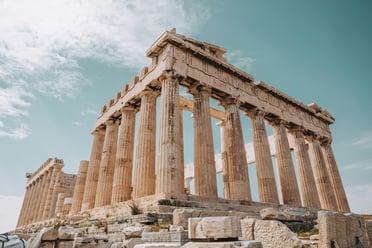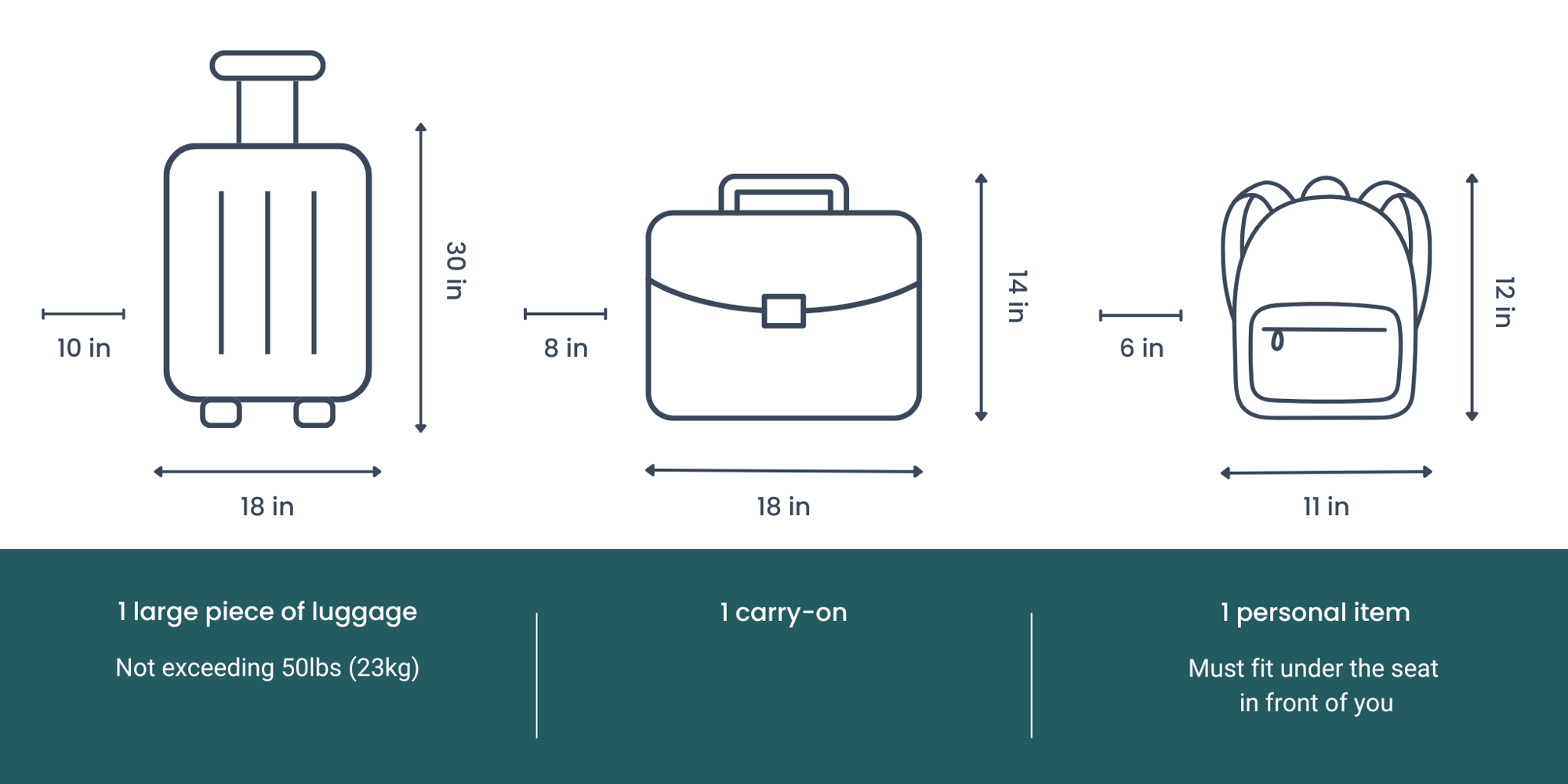Greece Destination Guide
This essential guide will help you prepare for an unforgettable journey through the land of gods, azure seas, and ancient wonders.



Essential Travel Information
Everything you need to know before your Greek adventure
Visa & Entry Requirements
- Schengen Area: Greece is part of the Schengen Area. Most travelers from the USA, UK, Canada, and Australia can enter visa-free for up to 90 days.
- Passport Validity: Must be valid for at least three months beyond your departure date.
- Travel Insurance: Highly recommended with medical coverage.
Currency & Payments
- Euro (€) is the official currency.
- ATMs: Major towns have full-service banks, while smaller towns and tourist areas rely on widely available ATMs—be sure to inform your bank of your travel plans.
- Credit Cards: Accepted in most hotels and restaurants, but have cash for small businesses.
- Tipping: Appreciated but not mandatory; around 10% is standard in restaurants and cafés.
Mobile & Internet
- EU Roaming: European visitors can 'Roam Like at Home' with their EU SIM cards.
- Local SIMs: Cosmote, Vodafone, and Wind offer affordable data packages.
- WiFi and Cell Coverage: Wi-Fi is available in most accommodations, cafés, and restaurants, and Greece also has strong nationwide cell phone coverage.
- Power Adapters: Greece uses Type C and F plugs (European standard), 230V supply voltage.
Time Zone
- Greece follows Eastern European Time (EET) – UTC +2.
- Switches to Eastern European Summer Time (EEST) – UTC +3 from late March to late October.
Climate & Weather
- Mediterranean Climate: Hot, dry summers and mild, rainy winters.
- Best Time to Visit: April-June and September-October for mild temperatures and fewer crowds.
- Summer (June-August): Hot with temperatures 30-35°C (86-95°F). Very popular but crowded.
- Winter (November-March): Mild in southern areas, colder in the north. Many island services close.
- Spring & Fall (April–June, September–October): Ideal for travel, with mild weather and fewer crowds.
Emergency Contacts
- European Emergency Number: 📞 112
- Police: 📞 100
- Ambulance: 📞 166
- Tourist Police: 📞 1571
Packing Checklist for Greece
Use this checklist to ensure you pack everything you need for your Greek odyssey
Travel Documents & Essentials
- Passport (valid for at least 3 months beyond departure)
- Travel insurance details
- Flight itinerary & accommodation bookings
- Credit/debit cards
- Euros (€) in cash
- International driver's license (if planning to rent a car)
- Copies of important documents (separate from originals)
- Emergency contact information
Clothing & Accessories
- Lightweight, breathable clothing
- Swimwear (2-3 sets recommended)
- Cover-ups for beach to town transitions
- Comfortable walking shoes for ancient sites
- Sandals for beach and casual wear
- Hat or cap for sun protection
- Sunglasses with UV protection
- Light jacket or sweater (for evening sea breezes)
- Modest clothing for visiting churches (shoulders/knees covered)
Health & Safety
- High SPF sunscreen (reef-safe recommended)
- After-sun lotion or aloe vera gel
- Insect repellent
- Basic first-aid kit
- Personal medications in original packaging
- Motion sickness remedies (for ferry journeys)
- Hand sanitizer & wet wipes
- Reusable water bottle
- Travel-size toiletries
Electronics & Gadgets
- EU power adapter (Type C/F)
- Phone & charger
- Camera & charger (Greece is extremely photogenic!)
- Portable charger/power bank
- Waterproof phone case for beach days
- E-reader or books for beach relaxation
- Headphones
- Optional: underwater camera for snorkeling
Packing Tips for Greece
- Pack light, especially if island hopping with ferries! Many islands have cobblestone streets and steps.
- Temperatures can drop at night—especially along the coast, in the mountains, and during spring or fall—so pack layers to stay comfortable from day to night.
- Many Greek beaches are pebbled rather than sandy - consider packing water shoes.
- If visiting in high summer (July-August), focus on lightweight, breathable fabrics.
Top Destinations & Experiences in Greece
Discover the incredible places to visit during your Greek adventure

Athens
The cradle of Western civilization, Athens blends ancient wonders with a vibrant modern city.
Must-See Attractions:
- Acropolis & Parthenon – The iconic symbol of Ancient Greece.
- Acropolis Museum – Houses artifacts found on the Acropolis.
- Plaka District – Charming old neighborhood with shops and tavernas.
- National Archaeological Museum – Greece's largest archaeological museum.
Santorini
Famous for its stunning caldera views, white-washed buildings, and spectacular sunsets.
Island Highlights:
- Oia Village – Postcard-perfect views and sunset spot.
- Fira – The bustling capital with shops and restaurants.
- Red Beach & Black Beach – Unique volcanic beaches.
- Akrotiri Archaeological Site – Ancient Minoan settlement preserved by volcanic ash.


Meteora
A geological wonder with monasteries perched atop giant rock formations.
Don't Miss:
- Great Meteoron Monastery – The largest and oldest active monastery.
- Varlaam Monastery – Known for its beautiful frescoes.
- Sunrise/Sunset Views – The changing light creates magical vistas.
- Hiking Trails – Several paths offer different perspectives of the rock formations.
Must-Try Greek Cuisine
Greek cuisine is a Mediterranean treasure with fresh ingredients, olive oil, and herbs. Here are some dishes you shouldn't miss:
Greek Salad
Fresh tomatoes, cucumber, bell peppers, onion, olives, and feta cheese with olive oil.
Souvlaki
Grilled skewers of meat served with pita bread, tzatziki, and fresh vegetables.
Moussaka
Layered dish with eggplant, potatoes, meat sauce, and béchamel sauce.
Dolmades
Grape leaves stuffed with rice, herbs, and sometimes meat.
Saganaki
Fried cheese appetizer, typically served with lemon juice.
Baklava
Layered pastry with nuts and honey syrup, a perfect sweet treat.
Local Culture & Responsible Travel
Tips for respectful travel and cultural awareness during your Greek adventure
Cultural Etiquette
- Greetings: Greeks are warm and friendly. A handshake is common when meeting someone new. They also greet with a friendly “Yasou” (hello) and appreciate polite gestures such as saying “Efharisto” (thank you).
- Religious Sites: Dress modestly when visiting churches and monasteries. Shoulders and knees should be covered.
- Meal Times: Greeks eat late - lunch is typically after 2pm, and dinner often starts after 9pm.
- Philoxenia: The Greek concept of hospitality is deeply rooted in the culture. Don't be surprised by locals' generosity.
- Greek Time: A more relaxed approach to punctuality, especially on islands. Embrace the leisurely pace.
Responsible Tourism
- Water Conservation: Greece faces water scarcity, especially on islands. Be mindful of your usage.
- Plastic Pollution: Bring a reusable water bottle and shopping bag to reduce plastic waste.
- Marine Protection: Use reef-safe sunscreen and never touch marine life while snorkeling or swimming.
- Cultural Heritage: Never remove artifacts or pieces from archaeological sites.
- Support Local: Choose locally-owned businesses, restaurants, and guides when possible.
⚠️ Important Safety Note
While Greece is generally safe for tourists, be aware of pickpocketing in crowded areas, especially in Athens. Keep valuable belongings secure and be vigilant in tourist hotspots and on public transport.
Additional Travel Tips
- Accommodations: Space is a precious commodity in Europe, especially in its most dense cities; be prepared for smaller hotel rooms. The same goes for bathrooms and elevators; don’t be surprised if they feel cozier than those in the US.
- Drinking Water: Tap water is generally safe in mainland cities, but filtered or bottled water is recommended—especially on the islands. Most hotels provide water jugs for refilling your reusable bottle.
- Flights: Need help searching for a flight? We recommend Skyscanner.com to compare different routes and rates. Click here to search!
- Sailing: Sailing season runs from April to November.
- Public Transportation: Reliable and affordable in major cities and between key destinations. There are bus systems and Taxis throughout Greece, even in the small towns and on the islands.
- Ferries: Connect the islands efficiently, but can be delayed or canceled due to weather—plan travel accordingly. Some ferry routes and island services operate only from April–October. Off-season ferry schedules to smaller islands can be extremely limited.
Tipping
Tipping Suggestions: Tips for guides, drivers, and restaurants are not included. Tips provide supplemental income, and, while not mandatory, are greatly appreciated. If the local teams have added to the experience, please reward them.
| Guides | USD $4-6 per person/per day | |
| Drivers | USD $1-3 per person/per day | |
| Restaurants | 15-20% of the total bill |
Luggage Restrictions

